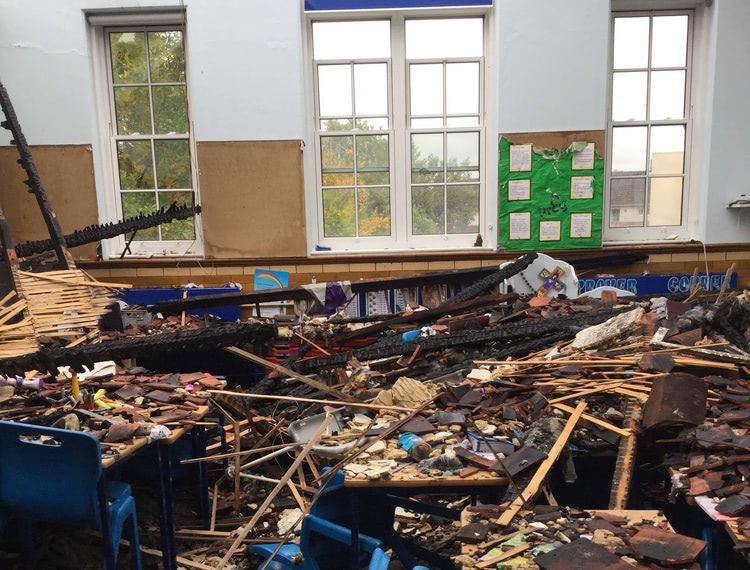More than 1,100 classrooms gutted by school blazes in five years

School fires have destroyed the equivalent of 1,100 classrooms in the last five years, new figures reveal.
Fire crews have been called to tackle 2,300 school blazes in England, which completely gutted 47 primary and secondary schools, and seriously damaged 230 others.
More than 74,000 square metres, an area equivalent to 10 football pitches, of teaching facilities have been damaged by fire in this time, according to analysis of Home Office data by leading insurer Zurich Municipal.
Zurich Municipal now estimates 390,000 teaching hours could be lost in the next year as a result of large fires alone, causing disruption for 28,000 children, who may already be struggling to catch up following school closures during the pandemic.
The findings – based on Home Office data from all 44 fire authorities in England –has led to renewed calls for mandatory sprinklers to be fitted in new and refurbished schools, bringing the country into line with Wales and Scotland where they are already compulsory.
Tilden Watson, Zurich Municipal’s Head of Education, said:
“Young people have been disproportionally impacted by the pandemic. Ministers must ensure no more classroom time is lost for a generation that has already fallen behind. These figures highlight the devastating impact of fires on the school estate. Unless the government changes the law on sprinklers, accidental and malicious fires will continue to blight schools and children’s futures.”
Between April 2015 and April 2020, 1,467 primary schools and 834 secondary schools were hit by blazes. Just two per cent of these schools were fitted with sprinklers. Zurich estimates the average repair bill for large fires alone is £2.9m, with some fires costing up to £20m.
The findings come as the government embarks on one of the biggest school building booms in recent times, with £1bn being poured into rebuilding 50 schools over the next five years.
But Zurich warns that, without sprinklers, fire could damage five times as many schools as will be improved under the government’s rebuilding programme.
Watson said: “Fire won’t just wipe out progress in improving the condition of schools, it will send it into reverse. It makes no economic sense to pump millions of pounds into refurbishing schools without protecting them with sprinklers. Sprinklers are proven to contain the spread of blazes and limit the damage they inflict.”
As part of its “levelling up” agenda, the government intends to target 70% of its £1bn funding at schools in the Midlands and North. Zurich’s analysis, however, shows that three out of the five fire authorities with the highest rates of school blazes – Greater Manchester, West Midlands and West Yorkshire – fall in these regions. Watson said this makes the case for sprinklers in new and refurbished schools even more pressing.
Watson added: “It’s absolutely right that the government invests in these areas. But without protection from sprinklers, fires will continue to break out unchecked. The Prime Minister must prove his ambitions to ‘level up’ Britain are more than a slogan. This means protecting schools that are crucial to the North’s economic success. Children get only one chance at an education; every extra day missed harms their attainment and life chances. The government’s failure to mandate sprinklers in schools is exposing pupils, teachers and firefighters to an unnecessary level of risk. It’s not just life safety the government should be concerned about, but the impact of all too frequent school fires on children’s life chances.”
When a school fire breaks out, Zurich’s analysis suggests there is a one in three (32%) chance of it spreading beyond the initial item ignited, potentially going on to cause serious damage.
Gavin Tomlinson, Sprinkler Lead, National Fire Chiefs Council, said:
“The case for sprinklers in schools is extremely compelling. The disruptive effect these fires have on whole communities is stark and the cost of the fire is felt well beyond rebuild costs. The impact can be devastating and, in the year where education has been so severely disrupted, school fires put huge additional pressure on the education service and parents.
“Schools are important community assets which need to be protected and we know that sprinklers are both highly reliable and effective. When sprinklers operate, they will control or extinguish a fire in 99% of cases.
“The NFCC will continue to call for the mandatory fitting of sprinkler systems in all new and refurbished schools in England.”
Eddie Tuttle, Director of Policy, External Affairs and Research at the Chartered Institute of Building, said:
“It is shocking to see the extent of the damage done by school fires, at a time when the Covid-19 pandemic has laid bare the vital importance of school attendance to our children’s futures. The potential damage done to classrooms by fires will lead to more teaching hours lost and more disruption for students, families and communities, at a time when so many are already struggling to manage. Continued school blazes will have profound consequences for the next generation, and one school fire – let alone 2,300 – is one too many.
“The widespread lack of sprinklers in schools is astonishing, given that they are a proven means of limiting the spread of fire and the destruction it causes. It is further concerning given that the Government plans to embark upon the biggest school rebuilding programme in a generation, risking £1bn of public funds being lost to preventable blazes. As major building safety reforms commence their journey through Parliament, the Government must take this opportunity to mandate sprinklers in new and refurbished schools, to improve the fire safety of our built environment and protect pupils, teachers and families from unacceptable and needless risk.”











Responses